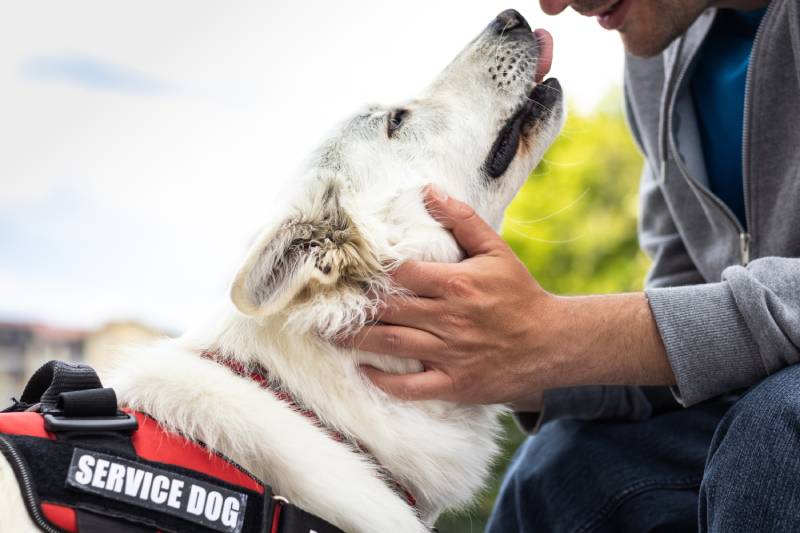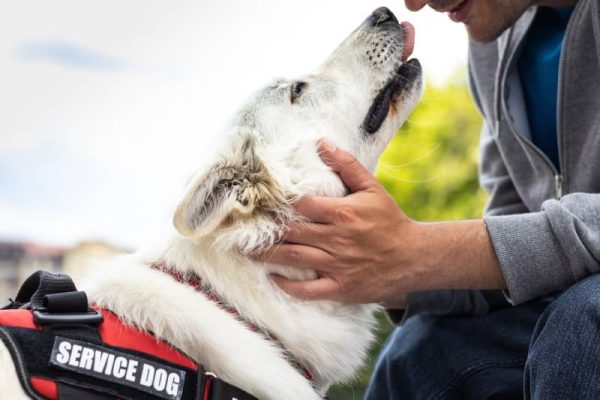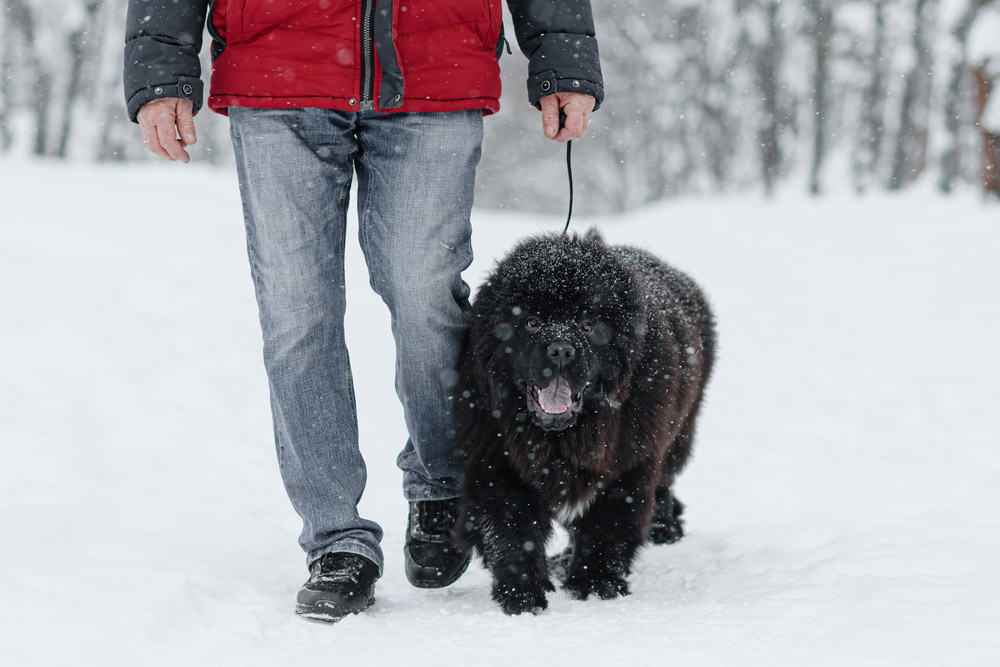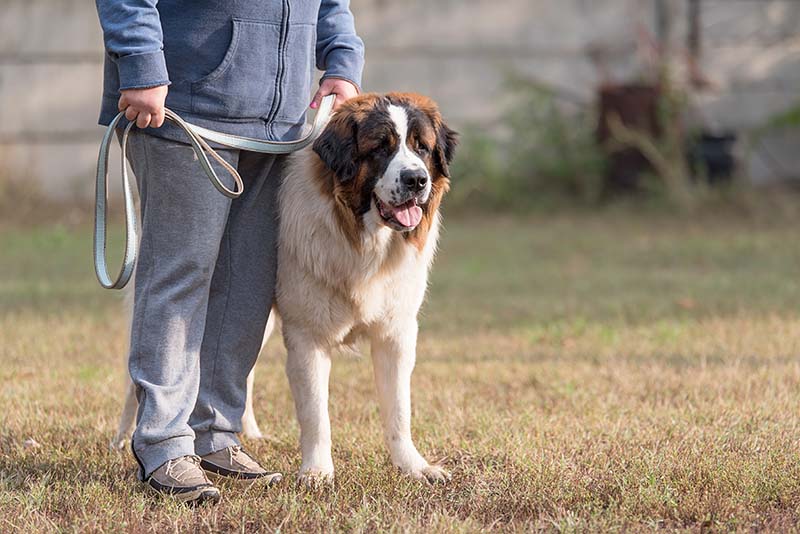Dogs are intelligent, friendly, caring, and loving, which is why they make the perfect human companions. Since canines are extremely smart, they can be trained to do various things, from simple tricks to more complex tasks. Due to their trainable nature, dogs can provide excellent support for people with physical or mental disabilities.
Many people are familiar with service dogs, which are trained to help, do work, or perform tasks for people with disabilities. There are several types of service dogs, each serving a different purpose. Here, we discuss psychiatric service dogs, including what they are, what they do, who can use them, and how they help people!
What Are Psychiatric Service Dogs?
Psychiatric service dogs are specially trained canines that help and work with people who suffer from mental illnesses or have learning disabilities. Due to the extensive training that they get, these dogs can help their owners with various tasks that they might be unable to do by themselves or enable them to live more independent lives.
Typically, anyone suffering from a mental disability can get a psychiatric service dog to provide emotional support, comfort, assistance, and protection. Psychiatric service dogs can help people with mental disabilities perform tasks that may be challenging due to their condition, help in crowded environments, and deal with emergencies.
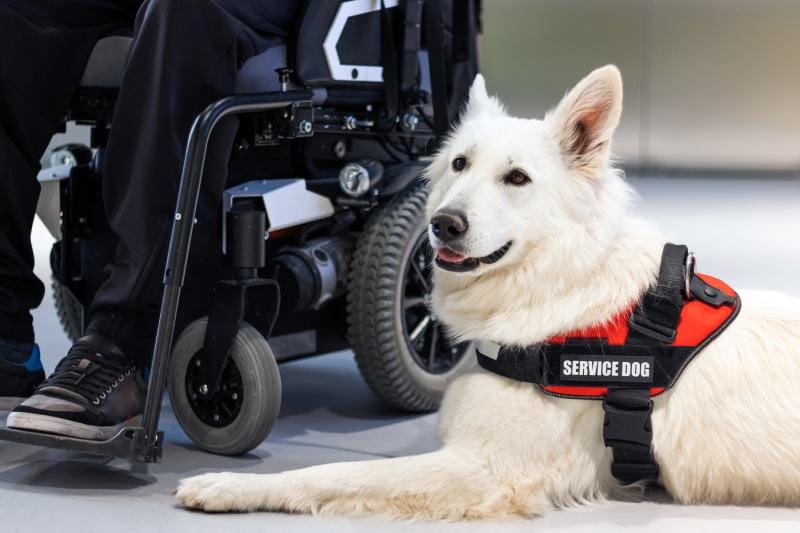
What Do Psychiatric Service Dogs Do?
Psychiatric service dogs get extensive training that enables them to perform various tasks on behalf of their owners. These dogs learn how to provide emotional support while also being able to perform various everyday tasks and commands, including:
- Guiding a disoriented handler — Certain mental conditions may cause people to become confused or disoriented at times, which may lead to them getting lost or being unable to find their way home. In such situations, psychiatric service dogs can help their owners by guiding them back home or to another specific location.
- Assisting with balance — Psychiatric service dogs can help owners who become unstable or unsteady due to their mental state or the medication that they take. For example, if a person with a psychiatric service dog is feeling confused, drowsy, or dizzy, the dog will provide the needed support for the person to walk to a safe place or stand until ready to go to a safe spot.
- Bringing medication to their owner — Some people are unable to get their medication the moment that they need it. Psychiatric service dogs know how to recognize these situations via different signs or cues, so they can bring the needed medication to their owners.
- Fetching a phone or particular device — Psychiatric service dogs can fetch various devices, such as a phone, in case of an emergency.
- Getting help in emergencies — Psychiatric service dogs are smart and well-trained, so they know how to sense emergencies and how to react to them. In emergency situations, such as a person having a panic attack, these dogs will know how and where to get the needed help.
- Creating a signal to alarm someone of a dangerous situation — If a dangerous situation like a fire occurs, and a person is unable to react due to their medical condition or the medications that they’re taking, their psychiatric service dog will create a signal to inform their owner of what’s happening and help them react and respond.
- Providing tactile stimulation — Dogs have extremely high senses; if someone is having an anxious episode or a PTSD attack, the psychiatric service dog can sense that and provide tactile stimulation to calm the person.
- Blocking others in public spaces — Some people suffering from mental disorders and disabilities may have problems being near people in crowded areas; in such situations, psychiatric service dogs place their bodies in various positions to keep their handlers away from others.
- Interrupting and redirecting their owners — These dogs are known for being able to interrupt dysfunctional and destructive behaviors, while also redirecting their owners’ attention. In this way, they help their handlers focus on other things, which helps them relax.
- Waking up their owner — Psychiatric service dogs are taught how to wake up their owners by licking them, barking, or pawing if they faint or overdose.
Overall, psychiatric service dogs are extremely beneficial for those who suffer from a mental disorder, as they can make life easier and provide the necessary emotional support and companionship.
Where Can Psychiatric Service Dogs Go?
According to the ADA (Americans with Disabilities Act), psychiatric service dogs can accompany their owners everywhere, even in areas and places that typically don’t allow pets, such as:
- Restaurants
- Hospitals
- Shops
- Schools
- Hotels
These rules can also apply to specific types of housing, including:
- Emergency shelters
- Housing at public/private universities
- Public housing run by various governments (city, county, state)
Different rules may apply to psychiatric service dogs accessing the work sector, which are determined by the Equal Employment Opportunity Commission. The rules may also differ for air travel, which are determined by the Air Carrier Access Act. The U.S. Department of Transportation/Aviation Consumer Protection Division can provide you with details about regulations for psychiatric service dogs.
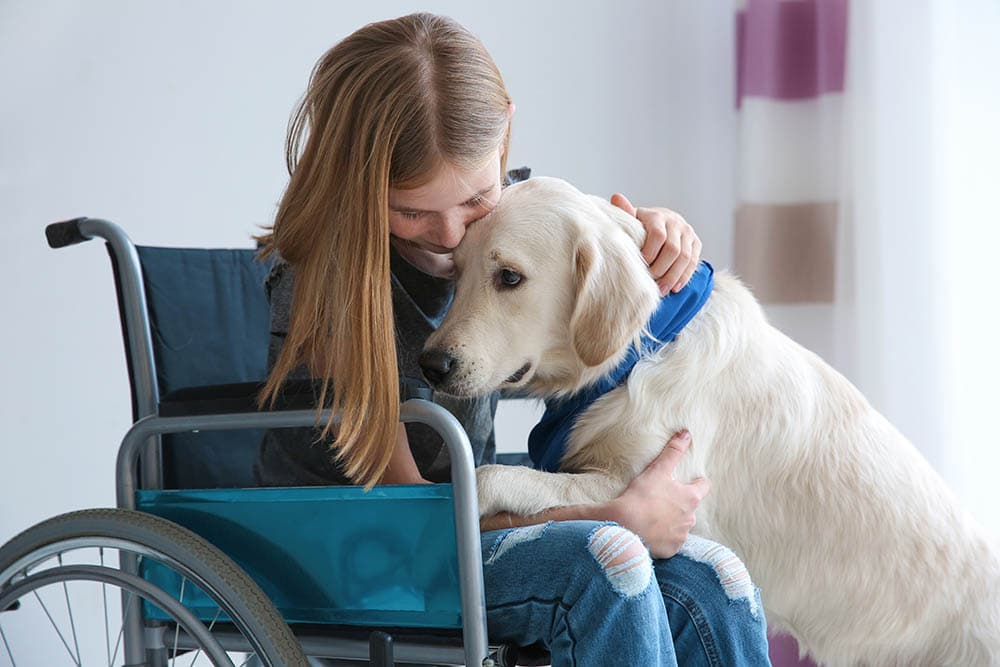
What Are the Different Types of Service Dogs?
There are various categories of service dogs, each with unique benefits and characteristics that help with specific conditions and situations. Here’s a list of all the different types, along with what they do and who they can help:
- Autism-service dogs — These service dogs are trained to help people with autism spectrum disorder; they are typically paired with autistic children to help them with social interactions and connecting with other kids. However, they can also provide support for autistic adults.
- Diabetic-alert dogs — These service dogs are trained to alert their owners of potentially deadly changes in their sugar levels. These dogs will let their owner know that they need to test their blood and inject insulin/glucose if necessary.
- Allergy-detection dogs — These service dogs are trained to detect allergens and alert their owners of their presence. They are commonly assigned to children, who tend to have more severe responses to allergies than adults. It’s also common for these dogs to carry vests with allergy medication in case of an emergency.
- Guide dogs — These service dogs are trained to help blind people and low-vision individuals get around and perform their daily tasks. They typically wear a special harness with a handle for their owners. Unlike most other service dogs that are trained to always be obedient, these dogs are considered partially obedient, meaning they can make their own choices if they assess a particular situation to be potentially dangerous.
- Hearing dogs — These dogs are trained to assist deaf people or those with impaired hearing. They typically react to various cues to help their owners know if there’s a dangerous situation occurring nearby.
- Mobility-assistance dogs — These dogs are trained to help people with mobility issues; their main tasks include fetching particular items, opening doors, turning on lights, or pressing buttons. They can also help with balance-related issues and help their owners walk or stand easier.
- Psychiatric-service dogs — These dogs are trained to help people with learning disabilities and mental disorders, including PTSD, anxiety, and depression. They can provide the necessary emotional support while also performing various tasks to promote independence and improve the life quality of their owners.
- Seizure-alert dogs — These dogs are trained to assist their owners before, during, and after a seizure. They can get help, move the person to a safe location, or bring medicine to them.
Psychiatric Service Dogs Subtypes
There are several subtypes of psychiatric service dogs, including the following.
1. PTSD Psychiatric Service Dogs
These psychiatric service dogs are specially trained to help people suffering from PTSD. Those with PTSD have typically experienced an extremely stressful or life-changing situation, which causes various symptoms, such as severe anxiety, panic attacks, and nightmares.
Tasks that PTSD psychiatric service dogs may perform include:
- Helping their handler in crowded areas
- Retrieving medications
- Calming their handler
- Providing security enhancement tasks
- Interrupting destructive behaviors and redirecting their handler
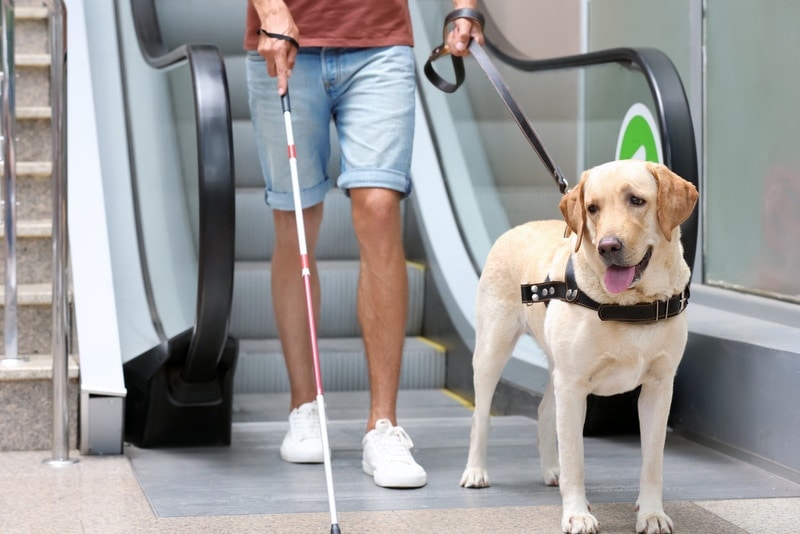
2. Anxiety Psychiatric Service Dogs
These psychiatric service dogs are specially trained to help people suffering from anxiety. Chronic anxiety in people can often lead to panic attacks and compulsive behaviors. In such situations, anxiety psychiatric service dogs can help anxious people by:
- Keeping their handler grounded
- Retrieving medications
- Applying deep pressure therapy
- Recognizing the signs of an oncoming panic attack
- Leading the handler out of a building
- Finding a phone/particular device
- Keeping other people away from their handler in crowded areas
3. Depression Psychiatric Service Dogs
These psychiatric service dogs are specially trained to help people suffering from depression. Many depressed people have trouble leaving their room or home or engaging in regular daily activities. Depression psychiatric service dogs can help these people in various ways, including:
- Providing comfort and emotional support
- Retrieving medications
- Providing tactile stimulation
- Helping the handler establish an active daily routine
- Preventing the handler from oversleeping
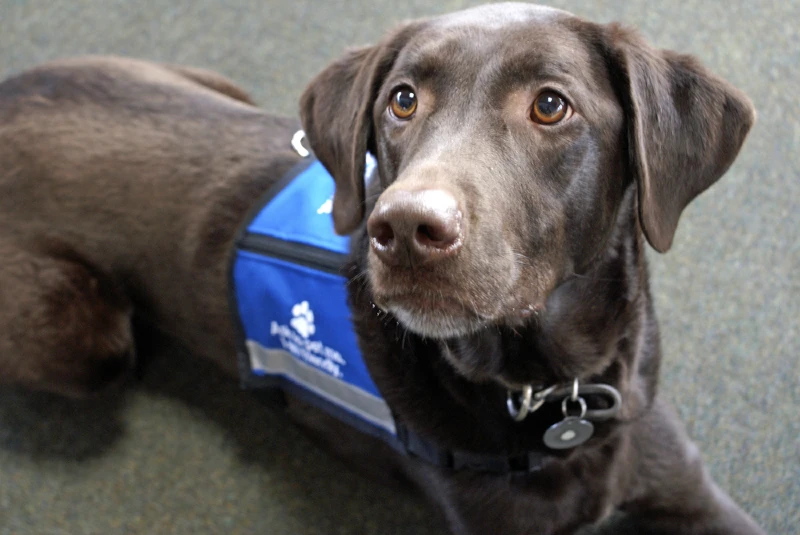
 Who Can Use Psychiatric Service Dogs?
Who Can Use Psychiatric Service Dogs?
Psychiatric service dogs are meant to perform tasks and help mentally disabled or challenged people in their daily lives. These dogs can help people with various mental illnesses, including:
- Anxiety
- Depression
- PTSD
- Obsessive-compulsive disorder
- Social phobias
- Bipolar disorders
- Schizophrenia
- Panic attacks
How Can Psychiatric Service Dogs Help People?
Psychiatric service dogs help mentally disabled people or those with learning disabilities in various ways. They provide the necessary emotional and mental support for their handlers to get through their day more easily.
These dogs encourage their owners to be more active, help them maintain a daily routine, and provide the needed companionship for their owners to feel loved and protected. They also know how to perform all kinds of important tasks and react in emergencies, which can be crucial for mentally disabled people in certain situations.
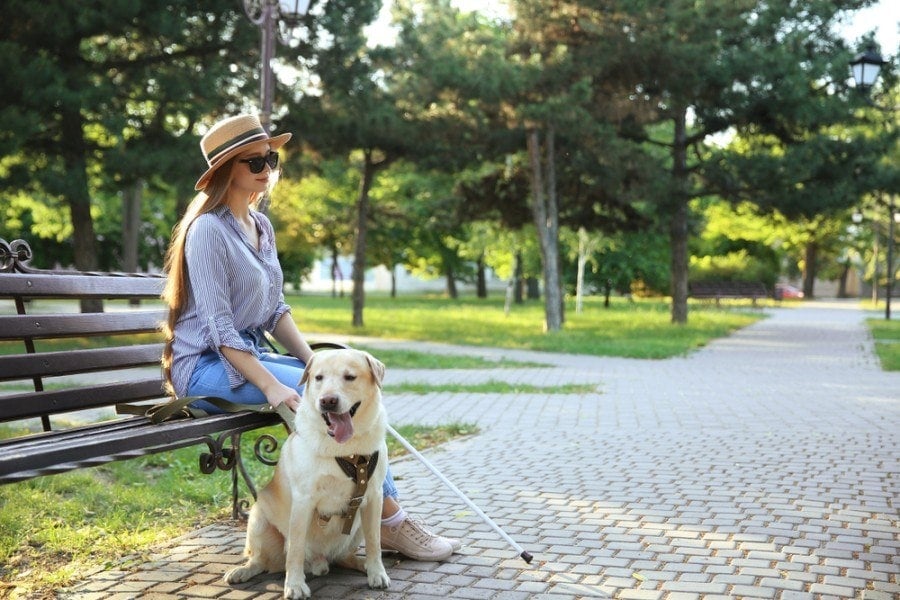
Frequently Asked Questions (FAQs)
Which Dog Breeds Make the Best Psychiatric Service Dogs?
There are no specific breed requirements when it comes to qualifying as a psychiatric service dog, meaning any breed could perform these tasks if properly trained. However, the dog must be well-behaved and good-natured.
Before choosing a breed for your psychiatric service dog, here are the key characteristics that they should have:
- Friendly and loving
- Calm nature
- A desire to work
- Eager to please
- Highly intelligent
What Is the Difference Between Therapy Dogs, Emotional-Support Animals, and Psychiatric Service Dogs?
Many people tend to mix up psychiatric service dogs with therapy dogs or emotional-support animals. While all these dogs have similar purposes, they are quite different.
The following table compares the three, showing their biggest differences.
| Different Types of Animals That Help the Disabled | |||
| Key Qualities | Therapy Dogs | Emotional-Support Animals | Psychiatric Service Dogs |
| Needs extensive training to help the owner with daily tasks | ❌ | ❌ | ✅ |
| ADA covered (allowed in public establishments) | ❌ | ❌ | ✅ |
| Can live with disabled owners | ✅ | ✅ | ✅ |
| May fly inside an airplane | ✅ | ✅ | ✅ |
| Primary function is to provide emotional support | ✅ | ✅ | ❌ |
| Specially trained to assist just one person | ❌ | ❌ | ✅ |
| Needs to tolerate a wide range of experiences | ❌ | ❌ | ✅ |
Conclusion
Psychiatric service dogs are specially trained to help people with mental disorders and learning disabilities go through their daily life as independently and carefree as possible. They can aid in handling daily tasks and provide emotional support for their owners. These dogs also have many benefits due to the ADA, which is why they can accompany their owners and provide support even in public places.
Featured Image Credit: 24K_Production, Shutterstock
Contents
- What Are Psychiatric Service Dogs?
- What Do Psychiatric Service Dogs Do?
- Where Can Psychiatric Service Dogs Go?
- What Are the Different Types of Service Dogs?
- Psychiatric Service Dogs Subtypes
- 1. PTSD Psychiatric Service Dogs
- 2. Anxiety Psychiatric Service Dogs
- 3. Depression Psychiatric Service Dogs
- Who Can Use Psychiatric Service Dogs?
- How Can Psychiatric Service Dogs Help People?
- Frequently Asked Questions (FAQs)
- Which Dog Breeds Make the Best Psychiatric Service Dogs?
- What Is the Difference Between Therapy Dogs, Emotional-Support Animals, and Psychiatric Service Dogs?
- Conclusion

